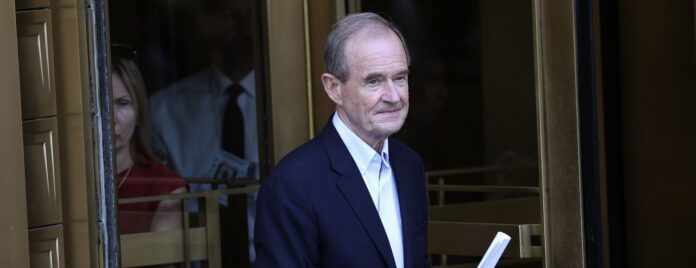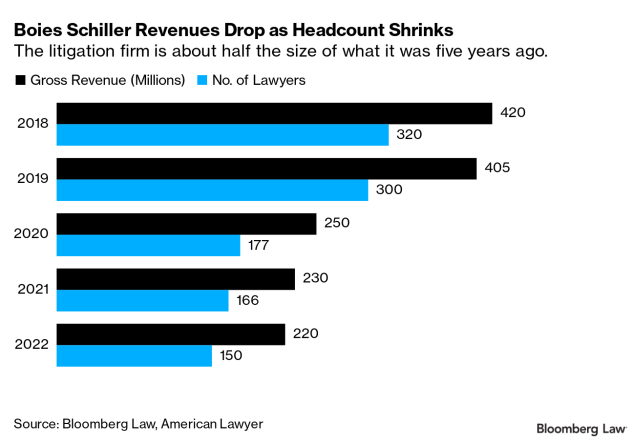The New York litigator set to replace David Boies at the helm of Boies Schiller Flexner will face no small task in directing a firm long synonymous with its legendary founder.
Boies, 82, is handing over the reins of the firm he built into a litigation powerhouse over the preceding two decades, a move that opened the door for Matthew Schwartz, a former assistant US attorney in Manhattan who gradually ascended the ranks at Boies Schiller after joining in 2015.
Schwartz, who is one of three co-managing partners, got the nod for chair during a Friday night partnership vote at the firm’s annual retreat in Florida. He will succeed Boies, who continues to have an active practice, in January 2025 after a year-long transition, the firm said.
Schwartz’s job as chair will include positioning Boies Schiller as a firm that can “outlast” the personality of its founders and “to be an institution,” he said in an interview.
Given Boies’ stature, that’s no easy feat.
“If you’ve got a predecessor who’s glorified and still around, you’re replacing an icon,” said Patrick McKenna, a law firm management consultant at McKenna Associates. “There’s a continuous comparison that goes on.”
Friday’s vote marks the first time Boies Schiller has cemented a leadership transition with a chair election. Two prior succession plans unraveled, with some potential leaders in waiting leaving as Boies and his remaining founding partner, Jonathan Schiller, resisted fully giving up the reins, according to four sources familiar with the situation.
“We had a period of trial and error,” Schwartz said. But he argued the chair vote shows how far removed the firm is from its succession woes.
“Over the last two or three years, we’ve had a group of managing partners that’s stable, an executive committee that’s been stable,” he said. “That’s what led David to the point saying he was ready to formally step aside and elect a successor. This demonstrates very clearly that this transition is real.”
‘Our Way’
Schwartz, 46, said he’s undaunted by the prospect of succeeding Boies because he isn’t viewing it as “stepping into his shoes.”
“I would be the first one to say that I’m not replacing David Boies,” he said. “I’m helping to take the firm that he created and to do it our way and my way and a way that works for the partnership.”
A native of Boston who grew up in New York, Schwartz graduated from Columbia Law School before working for nearly a decade in the Manhattan US Attorney’s office. Major cases he worked on included the prosecution of Bernie Madoff over a $64 billion Ponzi scheme.
After joining Boies Schiller’s New York office, he established a white-collar defense and investigations practice, where his clients have included Kazakhstan’s third-largest bank in a sprawling fraud cause.
Schwartz, along with partners Sigrid McCawley and Alan Vickery, became a co-managing partner in 2020 as part of a series of leadership reshuffles. He’ll continue as a managing partner, whose responsibilities include running the firm’s day-to-day operations, before starting a three-year term as chair in 2025.
Boies and Schiller will retain sway at the firm as members of the executive committee, which they will remain on as long as they are partners, according to a partnership agreement viewed by Bloomberg Law.
In that dynamic, it’s common for partners to defer to longtime chairs even after they shed the leadership title, McKenna said, which can create a “no-win situation” for their successors. It’s essential for firms to clearly establish how much sway, if any, the predecessor will have in order to have a successful transition, he noted.
“This is the third attempt” at a transition, said Bruce MacEwen, a legal industry consultant at Adam Smith Esq. “David Boies is legendary and whether you like him or don’t like him he’s earned the legend. It’s nevertheless true that there’s something about three tries and you’re out.”
Boies Legacy
Known for taking on Microsoft in a landmark antitrust case and pursuing legal action in support of LGBT+ marriage rights, Boies established his own litigation shop in 1997 after abruptly leaving Cravath Swaine & Moore due to a conflict relating to his representation of the New York Yankees.
The firm blossomed into an outfit that represented corporate defense clients while also maintaining an active class-action practice. At the time, that was an innovative model, with few firms performing both plaintiffs-side and defense work.
Boies “created a corporate model that didn’t really exist before,” said MacEwen.
But a wave of senior-level departures starting in 2018 engendered questions about the firm’s future. The exits also came as Boies faced scrutiny over his hardball tactics while representing disgraced film mogul Harvey Weinstein and Elizabeth Holmes, the Theranos CEO convicted of fraud.
Boies Schiller has lost more than half of its lawyers over the past five years and saw its gross revenue plummet. But the firm has said it’s emerged in a healthy position, with profits that grew by 13% last year and a slate of high-profile cases it has a role in.
It is anticipating a significant payout from a $2.7 billion settlement it secured in a long-running antitrust class action against Blue Cross Blue Shield. The firm’s cases targeting financial institutions over their alleged failures to screen red flags relating to disgraced financier Jeffrey Epstein have, meanwhile, led to more than $300 million in settlements with JPMorgan Chase and Deutsche Bank.
“The firm is in excellent shape,” Boies said in a Friday statement. “I look forward to watching the firm’s new leaders guide it into the future, as I continue to focus on my busy trial practice.”

